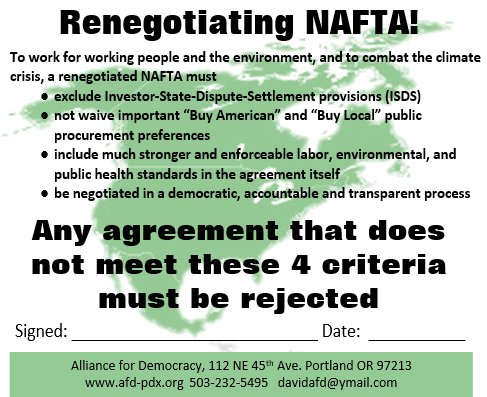Renegotiating NAFTA
|
During the 2016 presidential campaign, candidate Donald Trump repeatedly called for renegotiating NAFTA, the North America Free Trade Agreement. NAFTA is the twenty-plus year old agreement negotiated by Pres. George Bush, Senior and pushed through Congress by Pres, Bill Clinton. It was the first trade agreement which contained an Investor-State-Protection Clause, known as Chapter 11 in the agreement. So it cemented the corporate coup of international trade, a coup which had already achieved much via the World Trade Organization (WTO). Following the Battle in Seattle, where the WTO was having their international meeting of ministers and in which the protesters in the streets forced the cancellation of the meeting, it became clear that large multi-national global agreements were no longer going to be possible and corporate chiefs decided that bi-lateral and regional agreements would be the way forward for the corporate masters. It was with that perspective that NAFTA was agreed to by the United States, Canada and Mexico, and enacted.
Now with trade having been an issue in the 2016 presidential election, first because Democratic candidate Bernie Sanders bought it up repeatedly and then because Republican Donald Trump tapped into the fears of globalization with its damage to working families and the environment, President Trump has said that NAFTA will be renegotiated or tossed out entirely. But are the objectives of Trump the same as those who have opposed agreements like the US-So. Korea, Columbia, Panama and, most recently, the Trans Pacific Partnership? Assuming they are not, then what are the objectives for opponents of corporate free trade? Please see our page on Fair Trade for answers to these questions from a progressive American viewpoint. Common Frontiers, a coalition of Canadian social justice organizations, has issued a statement on these questions. This is part of their statement and reflective the same objectives that American progressive non-corporate forces share. Revision to the terms of the treaty must have at its core the objective establishment of fair trade not free trade and economic relations based on social justice, sovereignty and sustainable development. |
Popular Resistance wrote these as objectives for a Fair Trade agenda: We must demand that agreements are used to:
|
News and Articles
March 2017. ISDS: The Threat That Keeps on Threatening. While Trump talks about need to renegotiate NAFTA, he says nothing about Investor-State-Dispute-Settlement provisions of the agreement.
Feb. 2017. US Rep. Peter DeFazio (D-OR) introduces legislation requiring that NAFTA re-negotiations begin no later than June 1, 2017. Read the legislation here. Read the statement from Sierra Club here. Jan. 18, 2017. Trump, Canada and the future of NAFTA by MATTHEW KRONBYMILOS BARUTCISKI, writing in the The Globe And Mail Jan 18, 2017. Trump administration will press Canada, Mexico to reopen NAFTA, CBS News | Business |
Statements
May 2018 - NAFTA's Legacy for Mexico: Economic Displacement, Lower Wages for Most, Increased Migration A report from Public Citizen
April 2018 A Fair Trade Agenda: Renegotiating NAFTA for Working Families - a report from the Congressional Progressive Caucus Feb 6, 2018 Letter to Pres Trump by 6 US Democratic Senators, calling for "fundamentally rewriting NAFTA to eliminate its incentives to outsource American jobs, and to level the playing field by adding strong labor and environmental provisions...." Jan 27, 2017 Principles of a new U.S. trade policy for North American agriculture This is a statement on non-corporate farming organizations detailing the objectives of renegotiation of NAFTA. These organizations co-sponsored this statement: Food & Water Watch, Institute for Agriculture and Trade Policy, National Family Farm Coalition, National Farmers Union, R-CALF, Rural Coalition PDF copy Jan. 18, 2017 Groups from Mexico, Canada and the U.S. Demand NAFTA Replacement. Statement from the Citizens Trade Campaign (US), Common Frontiers (Canada) and Mexico Better Without the TPP (Mexico) |


